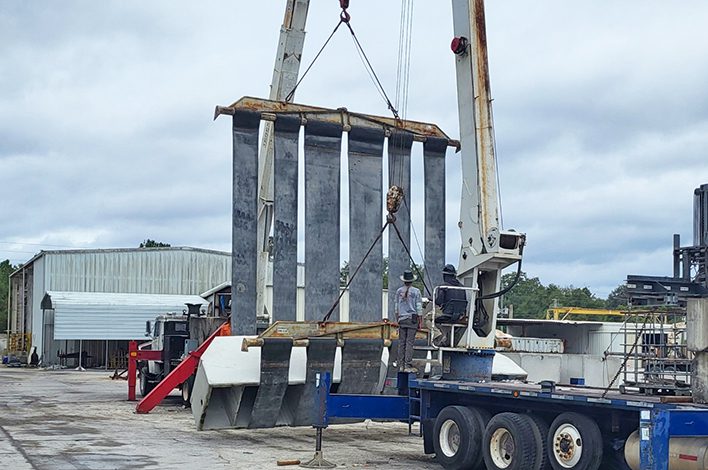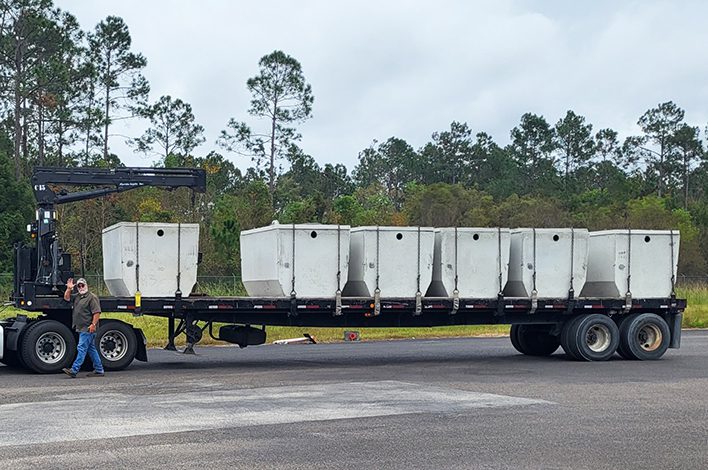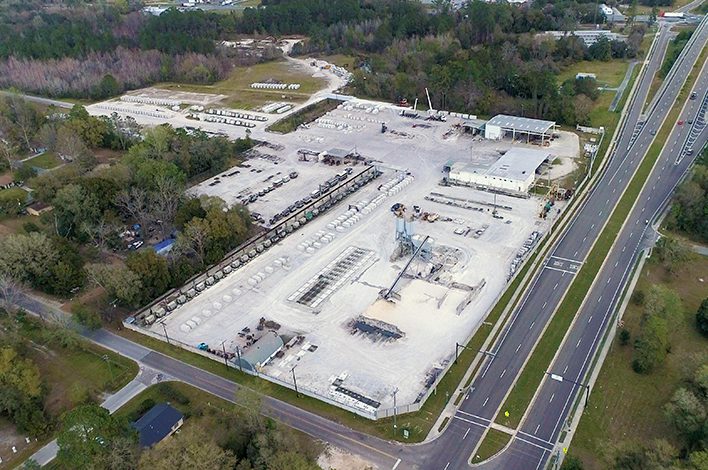Family-owned business still going strong after supplying tanks for Florida’s wastewater industry for more than 60 years.
In 1965, Treston E. Vause and his wife, Dulcie Vause, founded a ready-mix concrete plant in Hawthorne, Fla. Things went well until the mid-70s when it became difficult to obtain raw cement. Undaunted, Treston Vause converted the plant into a precast facility and began manufacturing precast septic tanks.
To address the challenges of the industry and provide input into regulatory discussions, Treston Vause, along with nine others, was a founding member of the Florida Septic Tank Association, now known as the Florida Onsite Wastewater Association (FOWA). Today, his daughters, Susan Allen, president of Florida Septic, and Ellen Vause, vice president of operations, continue to participate. Ellen Vause previously served as president of the organization, and Allen currently serves on its board of directors.
Allen recalled her father came up with the idea to donate $1 to the association for every association member who purchased tanks from Florida Septic. His savvy marketing strategy paid off, and Florida Septic expanded its reach from a local supplier to a statewide supplier.
Treston Vause also began the practice of purchasing raw materials from only American vendors, a practice Florida Septic continues today.
From the beginning, Florida Septic was a true family business with everyone pitching in. Treston Vause managed the plant, and Dulcie Vause handled the bookkeeping. Their three daughters — Ellen, Susan and Nancy — learned the business first-hand by helping part-time during high school and beyond. Treston Vause instilled them with his values of ethics, integrity, workmanship and customer service.
The company experienced continual growth, and in 1984 Treston Vause built a new, updated facility. In 1987, the company was still small — only 20-some employees — and mainly sold small septic tanks for the residential market. Treston Vause had big plans for expanding the company’s product line, but they were cut short when he died of a heart attack in 1987.
Facing Challenges
At the time of Treston Vause’s death, his daughters were only in their 20s. The big question was: Should the family sell the business or carry on? Treston had been a wonderful mentor, training Ellen Vause to become his “right-hand person.” Ultimately, the family felt they were prepared and opted to stay the course. Ellen became president, Susan, vice president, and Dulcie, secretary-treasurer. Nancy filled in wherever she was needed.
“It’s been a good livelihood for the 40 years that he’s been gone,” Ellen Vause said. “We did the same things we’d always done. Doing it like he had wanted it done. We just graduated from being part of the process to being the process.”
Florida Septic experienced continual growth, and, by 2006, it employed 88 employees and produced tanks with a capacity of up to 5,000 gallons. Things were looking up.
Then, the Great Recession of 2007 to 2009 hit. The economy crashed. Companies went out of business. Millions of workers lost their jobs. Florida Septic weathered the storm but went from 88 employees to 25.
Allen will never forget 2009. She faced two major challenges that year. For one, she assumed the role of president when Ellen Vause left to pursue another path. Dulcie became vice president and Andrew Palmer, Allen’s son, took over as secretary-treasurer.
In the aftermath of the Great Recession, the economy was still shaky and businesses continued to struggle.
“I had to rebuild the whole company and bring it back up from the bottom-out of the housing industry,” Allen said. “I went back in the trenches and got it going again. We rode it out, then brought it back up. And here we are today.”
Her second challenge was personal. She used the same determination and grit that helped her rebuild the plant to successfully battle cancer.

Balancing Professionalism with a Family Feel
Florida Septic now employs about 50 people. And every one of them is considered part of the family.
“The thing I’m most proud of is keeping the family atmosphere with a professional business and still putting out the quality and service we’ve always had,” Allen said.
Quality Control Manager Keith Maynard, 51, was working for another precast company when he applied at Florida Septic in 2006. It was the company’s family orientation that attracted him and keeps him there.
“Two or three guys have been here over 30 years, and a bunch of guys have been here 20-plus years,” Maynard said. “That should tell you the kind of company Florida Septic is — how they are and how they treat their employees.”
As far as working with Allen and Ellen Vause, he appreciates that each one has a different perspective.
“Susan’s very financial oriented and knows the business side very well, while Ellen looks at things from the production end of it,” Maynard said. “They work together so you get both perspectives.”
And that leads to a quality product.
“I challenge anyone in the state to have a stronger, more durable tank than what we produce,” Maynard said.
Donald Crosby, 69, started with the company in 1976 when he was 21. His experience with the company spans many different jobs, and he goes wherever he’s needed throughout the day.
Why has he stayed at Florida Septic for 48 years?
“Excellent co-workers, excellent management and a love of the industry,” Crosby said.
Crosby affirmed that the company’s core values and goals have remained the same — “just like Mr. Vause intended,” while it has advanced to take advantage of new technologies.
“You’re going to have to look extremely hard to find a company that’s better than Florida Septic,” Crosby said. “I really believe that. It’s knowledgeable. It’s got experience. And it enjoys helping people.”
Helping others also hearkens back to those core values.
“We keep a good, open rapport with everybody and do the right thing,” Allen said. “Quality. Service. Customer. We do our best.”
Keeping Up with the Times
Ellen Vause became active with NPCA while she was president, and Allen carries on that tradition. Anything that can make the plant more productive, more efficient or more profitable is a plus in their estimation.
“NPCA is where I learn things that help the company become a better manufacturer,” Allen said. “We like to be proactive in everything. If we stay on top of it, we don’t have to catch up with it later.”
She especially appreciates the videos on lean manufacturing and the connections she and Ellen have built over the years among other members and vendors.
Ellen Vause, who served on the NPCA Onsite Wastewater Committee for many years, returned to the company in 2022. She oversees the company’s general operations plus keeps an eye on wastewater trends and attends state and local regulatory meetings.
“In Florida, we’re heavily regulated on on-site wastewater systems,” Ellen Vause said. “We have to stay up on all the current regulations and upcoming ASTM changes, so we don’t get caught with product we can’t sell because the regulation has changed. It takes a while to modify your forms and your mix.”
Rolling with the Times
Over the years, Allen tweaked the business to keep it on track. In 2015, she shut down its installation business to concentrate on expanding manufacturing.
One thing the company hasn’t tweaked is its focus on customer service. For example, Florida Septic not only delivers septic tanks on-site but also sets them, so the customer doesn’t have to hire a crane.
“Some of these tanks weigh 30,000 pounds,” Allen said. “We’re all about quality and service to our customers. That’s what has kept us going for a very long time.”
The company also maintains an inventory of approximately 1,100 tanks so customers can get quicker delivery.
Florida Septic has supplied the state of Florida with hundreds of thousands of septic tanks over the years.
“I don’t think there’s any individual project that stands out,” Ellen Vause said. “It’s just a process of serving the industry and having the precast that they need to do their work.”
Here are a couple examples:
- Florida Septic supplied five 3,000-gallon tanks and five 2,000-gallon tanks for the Madison RV and Golf Resort in Madison, Fla.
- The company supplied Lakeland Septic Company with 1,500-, 3,000- and 3,300-gallon tanks for a new septic system for a farm worker housing project in Plant City.
- Florida Septic supplied a 1,500-gallon tank to Welland Plumbing for a Winn Dixie in Gainesville, Fla. The tank weighs 16,515 pounds by itself and 22,998 pounds with the lid.

Modernizing for Growth
Forty years after their father built a new precast plant, it’s received another update. Recently, Florida Septic purchased a customized Manufacturing Critical-Path Time (MCT) plant optimization package and integrated the new equipment with its existing equipment. The package includes the latest technology for dosing and conveying materials from existing bins and silos and a 4-yard automated mixer. The concrete hopper holds batches for proportioning in the molds, freeing the mixer to prepare another batch, which facilitates concrete pouring.
“We pour about 80 yards a day in our forms,” Vause said. “That equates to about 10,000 tanks per year, not including the pieces for the lids, the risers and other products.”
The new plant has been operational since November 2023.
“We went from six hours to fill forms down to three-and-a-half hours,” Allen said. “We’re doing the job in half the time.”
Other new equipment includes a 65-ton knuckle boom crane mounted on a Dorsey Tri-Axle drop deck trailer from Irving Equipment in Tifton, Ohio, and a new forklift from Forklift Exchange, headquartered in Fort Myers, Fla. Both are NPCA members.
“I’ve had really good luck with the vendors at NPCA’s trade shows,” Allen said. “NPCA’s been a real help.”
Florida Septic is always on a quest for improvement. Currently, it’s undergoing tank and vacuum testing on certain products to see if fiber might be an acceptable substitute for steel rebar.
“Everything in the precast industry that’s new, we try,” Ellen Vause said. “We’re always doing a little side experiment on something to try to do better.”
Looking ahead
The next step is to get the plant DOT-certified. Allen wants to diversify Florida Septic’s product line to include manholes and other DOT-approved products. She’s currently investigating the best products to add.
As for the future, she hopes her son, Andrew, will take over one day. Ellen’s grandson Jackson may join the company, as well. But if they take other paths, the company is still covered.
“We have three directors, heading different divisions of the company,” Allen said. “They can keep the company going while Ellen and I can be consultants.”
